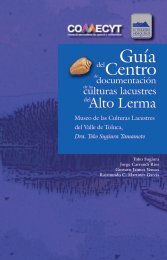Create successful ePaper yourself
Turn your PDF publications into a flip-book with our unique Google optimized e-Paper software.
NICHOLE SANDERS, CATHOLIC WOMEN AND PATRIOTISM: ACCIÓN CATÓLICA MEXICANA<br />
AND WOMEN’S ORGANIZING IN WORLD WAR II<br />
led by women. For example, in Nieves in<br />
July of 1943, a widow of a schoolteacher<br />
was shot during an earlier conscription protest,<br />
and thus protestors planned a “protest<br />
of women” if the federal army showed up<br />
to their next demonstration. In December<br />
1942, there were also reports of women<br />
throwing stones and attempting to lynch<br />
military inspectors and the local recruitment<br />
committee in Tuxtepec, Oaxaca, in order to<br />
disrupt the first conscription lottery (Rath,<br />
2013: 76).<br />
Other women’s groups, however, supported<br />
the war. Prominent feminists demanded<br />
that women should also be able to participate<br />
in military training. Rath notes that<br />
the military did not seriously consider these<br />
demands, as military reformers had, in part,<br />
sold the idea of conscription as a way to<br />
professionalize the military, and finally rid it<br />
of soldaderas, who many believed fostered<br />
“insubordination, promiscuity, and disease”<br />
(Rath, 2013: 68.) Military leaders did not<br />
support women in the military, but did not<br />
oppose Catholic women’s lay organizations<br />
work to support the troops.<br />
Catholic Women and Patriotism<br />
At the start of the war, popular Catholic<br />
magazines, such as Juventud (the official<br />
magazine of JCFM), ran at least one article<br />
or editorial most issues either discussing patriotism<br />
or outlining how women could be<br />
involved in the war effort. Sofía <strong>del</strong> Valle, as<br />
head of JCFM, used her position to encourage<br />
young Catholic women to support the<br />
war effort —she believed that “Mexico needed<br />
women of intelligence to protect Mexico<br />
for future generations” (Andes, 2019: 329).<br />
According to historian Stephen J.C. Andes,<br />
<strong>del</strong> Valle used Juventud throughout the war<br />
to push for an image of an intelligent feminine<br />
woman —one who was ready to serve<br />
her family, her patria and the world (Andes,<br />
2019: 330). Del Valle believed that intelligence<br />
and professionalism were central to<br />
the definition of appropriate Catholic femininity.<br />
And while it is impossible to know<br />
how many readers concurred with these<br />
views, it is nevertheless significant that the<br />
leadership of these organizations sought to<br />
promote a particular patriotic view.<br />
Juventud editors saw themselves as part<br />
of a common community and sought to promote<br />
this view to their readers. Sofía <strong>del</strong> Valle<br />
herself wrote:<br />
The elements of “una patria”, or of a nation,<br />
are these: the community of people of the<br />
same origin, territory, and language, we call<br />
these natural elements; and the moral elements<br />
—the community of beliefs, of customs,<br />
of habits, of laws, of a shared history […] above<br />
all, what constitutes a nation is a shared<br />
soul. Two principal things create this soul: the<br />
past —a rich inheritance of memories in common,<br />
and in the present— the will to value this<br />
shared past and to pursue a common future.<br />
This moral unity that unifies all souls creates<br />
one soul (Del Valle, 1942b: 9).<br />
She argued that Mexican Catholic women<br />
belonged to this community through<br />
their shared history and shared values. They<br />
would be a part of the soul of the country<br />
through their commitment to patriotic values.<br />
A common future for Catholic women<br />
intersected with the future of the country.<br />
The use of the word soul also implied that<br />
women were in intrinsic part of the body<br />
politic. While women may not have been<br />
able to vote, they nevertheless played a part<br />
in foundations of the body politic —its very<br />
essence.<br />
Through these editorials we can see that<br />
authors saw patriotism as a reciprocal relationship<br />
between Mexican families and the<br />
nation itself. They argued that “patriotism is<br />
the moral virtue that tilts us to surrender to<br />
the country the tribute of our love and to<br />
faithfully complete our debts to her that we<br />
have” (Del Valle, 1942b: 6).<br />
They noted that individuals and their families<br />
could not succeed in fulfilling their<br />
physical, intellectual, and moral obligations<br />
if they were not “framed in a larger permanent<br />
community more powerful than the<br />
family that will provide them with the necessary<br />
safeguards. This is precisely the ho-<br />
168



![bicentenario_1[V2]](https://img.yumpu.com/68677971/1/167x260/bicentenario-1v2.jpg?quality=85)
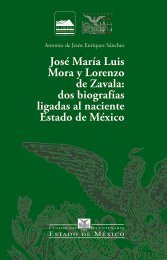
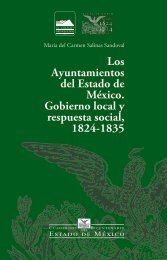
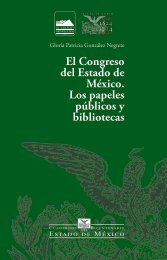
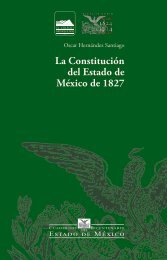
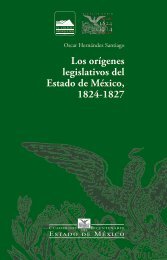
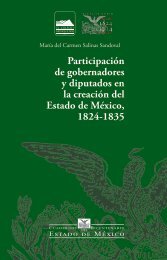
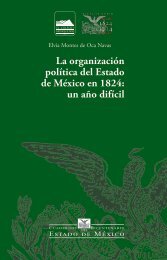
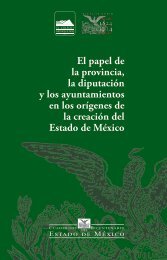

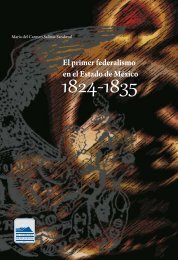
![El_primer_federalismoEM[final]_compressed (2)](https://img.yumpu.com/68483279/1/178x260/el-primer-federalismoemfinal-compressed-2.jpg?quality=85)

